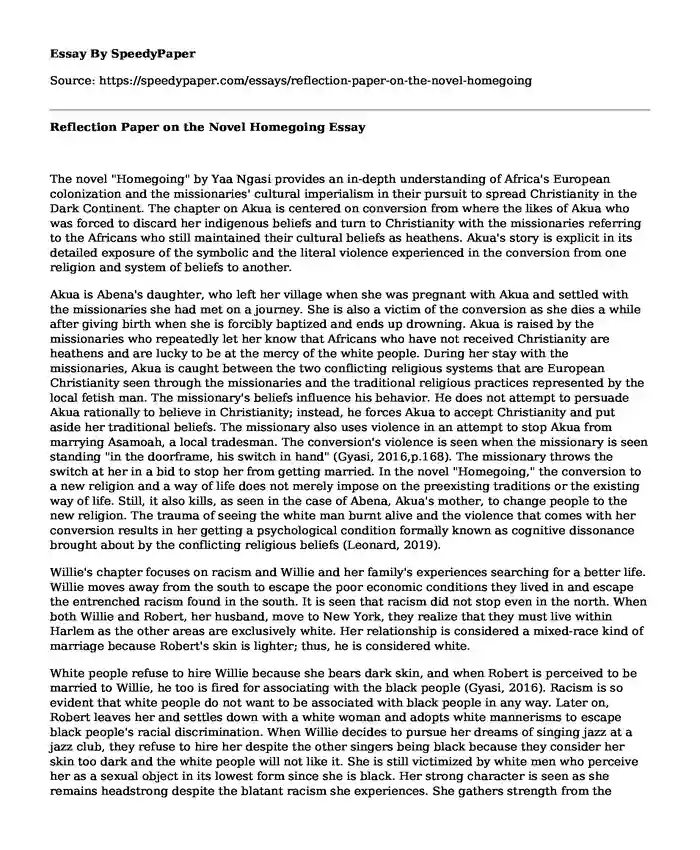
| Type of paper: | Essay |
| Categories: | Literature Writers |
| Pages: | 3 |
| Wordcount: | 716 words |
The novel "Homegoing" by Yaa Ngasi provides an in-depth understanding of Africa's European colonization and the missionaries' cultural imperialism in their pursuit to spread Christianity in the Dark Continent. The chapter on Akua is centered on conversion from where the likes of Akua who was forced to discard her indigenous beliefs and turn to Christianity with the missionaries referring to the Africans who still maintained their cultural beliefs as heathens. Akua's story is explicit in its detailed exposure of the symbolic and the literal violence experienced in the conversion from one religion and system of beliefs to another.
Akua is Abena's daughter, who left her village when she was pregnant with Akua and settled with the missionaries she had met on a journey. She is also a victim of the conversion as she dies a while after giving birth when she is forcibly baptized and ends up drowning. Akua is raised by the missionaries who repeatedly let her know that Africans who have not received Christianity are heathens and are lucky to be at the mercy of the white people. During her stay with the missionaries, Akua is caught between the two conflicting religious systems that are European Christianity seen through the missionaries and the traditional religious practices represented by the local fetish man. The missionary's beliefs influence his behavior. He does not attempt to persuade Akua rationally to believe in Christianity; instead, he forces Akua to accept Christianity and put aside her traditional beliefs. The missionary also uses violence in an attempt to stop Akua from marrying Asamoah, a local tradesman. The conversion's violence is seen when the missionary is seen standing "in the doorframe, his switch in hand" (Gyasi, 2016,p.168). The missionary throws the switch at her in a bid to stop her from getting married. In the novel "Homegoing," the conversion to a new religion and a way of life does not merely impose on the preexisting traditions or the existing way of life. Still, it also kills, as seen in the case of Abena, Akua's mother, to change people to the new religion. The trauma of seeing the white man burnt alive and the violence that comes with her conversion results in her getting a psychological condition formally known as cognitive dissonance brought about by the conflicting religious beliefs (Leonard, 2019).
Willie's chapter focuses on racism and Willie and her family's experiences searching for a better life. Willie moves away from the south to escape the poor economic conditions they lived in and escape the entrenched racism found in the south. It is seen that racism did not stop even in the north. When both Willie and Robert, her husband, move to New York, they realize that they must live within Harlem as the other areas are exclusively white. Her relationship is considered a mixed-race kind of marriage because Robert's skin is lighter; thus, he is considered white.
White people refuse to hire Willie because she bears dark skin, and when Robert is perceived to be married to Willie, he too is fired for associating with the black people (Gyasi, 2016). Racism is so evident that white people do not want to be associated with black people in any way. Later on, Robert leaves her and settles down with a white woman and adopts white mannerisms to escape black people's racial discrimination. When Willie decides to pursue her dreams of singing jazz at a jazz club, they refuse to hire her despite the other singers being black because they consider her skin too dark and the white people will not like it. She is still victimized by white men who perceive her as a sexual object in its lowest form since she is black. Her strong character is seen as she remains headstrong despite the blatant racism she experiences. She gathers strength from the church, which is the main source of solace and she ultimately can get her voice back is she moves closer to the Whites. Conclusively, racism is seen in its ugliest form in Willie's experiences, though she is able to rise above her skin color as she moves into the white population until she can move no further.
References
Gyasi, Y. (2016). Homegoing. Alfred A. Knopf.
Leonard, J. (2019, October 21). Cognitive dissonance: Definition, effects, and Examples. Www.Medicalnewstoday.com. https://www.medicalnewstoday.com/articles/326738
Cite this page
Reflection Paper on the Novel Homegoing. (2024, Jan 24). Retrieved from https://speedypaper.net/essays/reflection-paper-on-the-novel-homegoing
Request Removal
If you are the original author of this essay and no longer wish to have it published on the SpeedyPaper website, please click below to request its removal:
- Theological Mentors Essay Sample
- Diction and Imagery in Literary Texts, Free Essay for Everyone
- Literary Essay Sample: Desdemona's Symbolic Presence in Othello
- Realism in the Storm by Kate Chopin | Essay Example for Everyone
- Free Essay on Pickwick Papers, Penguin Classics by Charles Dickens
- Censorship in Literature, Free Essay Example
- Paper Example. Explication Essay for Poem "Money"
Popular categories




